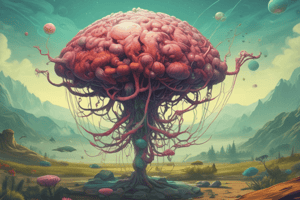Podcast
Questions and Answers
Match the following subfields of biology with their descriptions:
Match the following subfields of biology with their descriptions:
Cell Biology = Examining individual cells and their components Ecology = Analyzing interactions among organisms and their environment Physiology = Dissecting how the body works from top to bottom, from organ systems down to individual organs and tissues Taxonomy = Classifying organisms and establishing relationships among them
Match the following areas in biology with their focus:
Match the following areas in biology with their focus:
Evolutionary Biology = Charting changes in populations and species over time Behavioral Ecology = Unraveling what drives behavior adaptations in living organisms Neurobiology & Neuroanatomy = Decoding brain functions and neural circuits Medical Biology = Understanding disease causes, prevention, diagnosis, and treatment using concepts from multiple biological disciplines
Match the following biological disciplines with their applications:
Match the following biological disciplines with their applications:
Comparative Medicine = Applying findings across different species to improve human health Biotechnology = Harnessing tools, methods, and data from traditional disciplines for more innovative approaches to solving problems Genetics = Studying heredity and variation, including evolutionary genetics and genetic engineering Population Biology = Assessing trends in population dynamics, distribution, and abundance
Match the following biology fields with their focuses on structure:
Match the following biology fields with their focuses on structure:
Match the following biology disciplines with their emphasis on populations:
Match the following biology disciplines with their emphasis on populations:
Flashcards are hidden until you start studying
Study Notes
Exploring Science's Branches: A Focus on Biology
Biology is just one branch of science that delves into life's diverse forms and their fascinating interactions with each other and our planet. This field encompasses numerous disciplines, contributing immensely to our understanding of living organisms. As we explore this exciting realm of knowledge, let's uncover some key aspects of biological science.
Life's Scope
What makes up life? That question encapsulates the essence of biology's subject matter. Living creatures display unique traits such as growth, development, adaptation, reproduction, and metabolism — processes central to studying how they function, survive, and evolve. From microscopic single cells like bacteria, algae, and archaea all the way to multicellular complexities like plants, animals, fungi, and protists, biologists seek to decipher life's intricate mysteries.
Scientific Methodologies
The scientific method propels researchers forward by testing hypotheses through experimentation and observation. In biology, this process manifests itself in various ways. For instance, molecular techniques help us analyze DNA sequences, proteins, and gene expression patterns to understand evolutionary relationships or cellular functions. Genetic engineering permits scientists to transfer genes among species, leading to new discoveries and technologies. There's also human dissection, microscopy, and physiological experiments to investigate internal systems and structures of living beings.
Interconnected Subdisciplines
Broadly categorized under two main branches — microbiology and macrobiology — biology further splinters into several interrelated fields (Figure 1):

- Cell Biology: Examining individual cells and their components
- Genetics: Studying heredity and variation, including evolutionary genetics and genetic engineering
- Molecular Biology: Investigating the structure, function, and interaction of molecules within and between cells
- Ecology: Analyzing interactions among organisms and their environment
- Evolutionary Biology: Charting changes in populations and species over time
- Physiology: Dissecting how the body works from top to bottom, from organ systems down to individual organs and tissues
- Anatomy: Describing the form and structure of living things
- Taxonomy: Classifying organisms and establishing relationships among them
- Population Biology: Assessing trends in population dynamics, distribution, and abundance
- Behavioral Ecology: Unraveling what drives behavior adaptations in living organisms
- Neurobiology & Neuroanatomy: Decoding brain functions and neural circuits
- Comparative Medicine: Applying findings across different species to improve human health
- Medical Biology: Understanding disease causes, prevention, diagnosis, and treatment using concepts from multiple biological disciplines
In addition to these core areas, biotechnology and bioinformatics emerge as applied sciences, harnessing tools, methods, and data from traditional disciplines for more innovative approaches to solving problems.
Pioneering Insights
From Darwin's theory of natural selection to Watson and Crick's elucidation of the double helix structure of DNA, biology has been instrumental in revolutionizing human perspectives. From vaccination to gene editing technology, modern medicine relies heavily on biological principles and discoveries.
As we continue to explore this vast terrain of information, there undoubtedly remain countless secrets waiting to be unlocked, providing fresh insights that will deepen our comprehension, inspire breakthrough innovations, and ultimately shape our future.
Studying That Suits You
Use AI to generate personalized quizzes and flashcards to suit your learning preferences.




